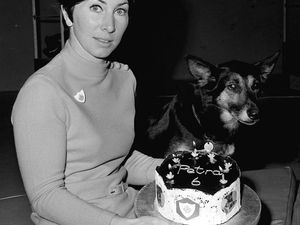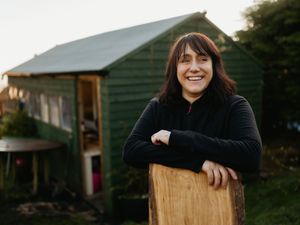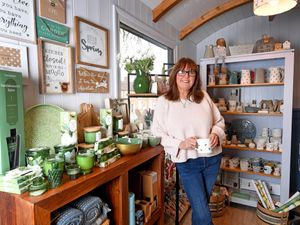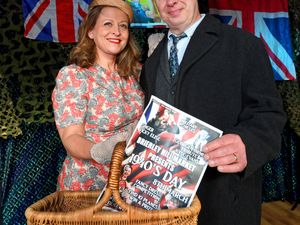Self-publish or find a publisher? The region's authors have their say
They say that everyone's got a book in them.

And, call us biased, but we believe that some of the best storytellers are right here on our doorstep.
Fortunately for us bookworms, it's easier than ever for the teachers, parents, bloke down the pub and shopkeeper with a tale to tell to share their works.
Getting a book published is no longer just a case of sending a manuscript to a publisher and waiting by the phone for a life-changing call. In days gone by, only a few writers' works made it into book shops and libraries.
But with the eBook market growing, getting published is now a case of taking matters into your own hands and making your voice heard. We catch up with some of the best authors from our region to find out whether self-publishing is the way to go. This time next year, we could be the next J.K. Rowling!
Last month, crime writer Angela Marson celebrated the sale of her one millionth novel. She released three books in her crime series last year, topping Amazon charts around the world.
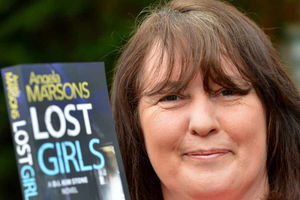
Her debut, Silent Scream, has sold hundreds of thousands of copies and was the Amazon bestseller in the UK for more than a month.
It also reached the top five in America, and has secured rights deals in nearly a dozen other countries.
Quite the achievement for a shopping centre security guard from Brierley Hill.
Her road to literary success wasn't an easy one, so we had to ask what she felt about self-publishing. Is it worth our readers, for example, trying their hand at it if they want to share their stories?
She tells us: "Personally I feel it is a good thing. I have been trying to share my work for more than 25 years and only wanted an opportunity. Over the years it has become harder to reach publishers as very few now accept unsolicited manuscripts and will only consider work submitted by an agent.
"In addition to my published books I have two books self-published through the Amazon KDP Program which have now reached a wider audience. I also know of authors who have secured traditional publishing deals after their efforts with self-publishing."
The Amazon Kindle Direct Publishing Program is a way for authors to get their books to market quickly. Publishing takes less than five minutes, appearing all over the world in Kindle stores within a day or two. Financially, an author self-publishing in this way can hope to earn up to 70 per cent royalty on sales to customers in counties such as the UK, Canada, Germany and as far as India, Brazil and Australia.
For Angela, it's a great thing. After all, in her experience, the 'traditional route' is not always the best one to take.
"Traditional publishers don't always get it right," she tells us. "My first book Silent Scream was represented by an agent initially and was rejected by them all. It has gone on to sell almost 800,000 copies and is being translated in 13 countries.
"This isn't a brag," she assures us, "just a demonstration that they don't always know what the readers want."
The figures speak for themselves. With such great success under her belt, we ask for her top tips, and she shares the rules that she lives by: "Never forget why you started writing in the first place," she says to hopeful writers. "It's easy to forget if you're submitting and facing rejection.
"Don't share your first draft with anyone until you've reached the end. That's your time to fall in love and bond with the story and any comments will colour your vision as you move forward. Finally, don't stop writing because you never, ever know what might happen." Angela should know, and her story is inspirational.
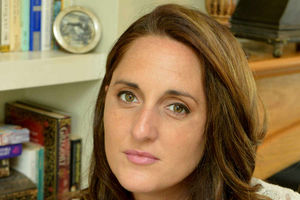
Anouska Knight was inspired by other successful writers to put pen to paper and share her work with the world. The career of the Rugeley author was launched on ITV, when she was crowned the winner of Lorraine's Racy Reads in 2013. Since then, Anouska has gone on to launch three novels, part of a new wave of Mills & Boon-published authors. She thinks that there are benefits to having a publisher that you wouldn't get from doing it yourself. She says: "I haven't yet self-published but opening up new avenues to those who are passionate about writing and getting their work out there can't be a bad thing.
"My own interest in writing really surged after reading up on the whole EL James phenomenon. I doubt I'll ever read her books but her success made writing seem far more accessible to us mere mortals and got me thinking about the possibilities.
"That said, given the choice I'd always opt for working with a publishers in the traditional sense. Good publishers provide the support, guidance and brutal edits a book really needs to make the transition from frazzled writer's mind to quality read."
For some authors, hitting the dizzying heights of superstar Hollywood-movie-deal writer isn't the be all and end all.Toby Neal is a Star journalist and author. He self-published Owd Jockeys At War, Shropshire Airfields and Shropshire Since 1900, all local history books to share with the community.
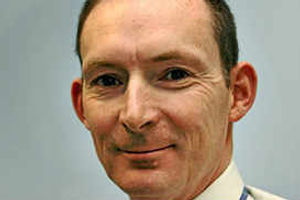
He shares his thoughts on the changing market: "Virtually anybody can get a book published these days, as there are various firms on the internet that make it easy. But the difference is that in the old days the publishers paid the authors, now the authors are paying the publishers.
"Having said that, the punters do get a professional-looking product, although I have seen one or two exceptions to that, and do have the pride of getting their names in print as an author. Even if it turns out that nobody buys except their immediate family and friends."
For many writers though, that's reward enough: "I think the self-published route is particularly good for family history books, which have no general interest and so are unlikely to sell, but ensure parents and grandparents leave a legacy for their children and grandchildren.
"I have self-published several books myself, writing them and laying them out, and then sending them as completed documents to the printers who simply print them. The big catch of course is the financial risk you take, as you never know if your books will sell and cover your costs, or you will be left with stacks of unsold books in your garage or under your bed."

